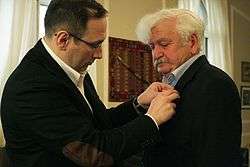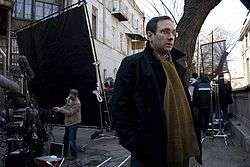Nika Rurua
| Nika Rurua ნიკოლოზ რურუა | |
|---|---|
|
| |
| Minister of Culture and Monument Protection of Georgia | |
|
In office 2008–2012 | |
| President | Mikheil Saakashvili |
| Preceded by | Grigol Vashadze |
| Succeeded by | Guram Odisharia |
| Personal details | |
| Born |
Nikoloz Rurua 17 March 1968 Georgia |


Nikoloz Rurua (Georgian: ნიკოლოზ [ნიკა] რურუა, born 17 March 1968) is a Georgian politician, and a former member of the Cabinet of Georgia in the capacity of Minister of Culture and Monument Protection of Georgia, from 10 December 2008 until 25 October 2012.[1] Rurua previously served as the Deputy Chairman of the Committee for Defence and Security of the Parliament of Georgia.
Early life and career
Born in Tbilisi into an artist's family, Rurua studied at the Meliton Balanchivadze Musical College,[2] after which proceeded to study TV directing at the Shota Rustaveli University of Theater and Cinema in Tbilisi.[3] He graduated from that institute in 1993 and joined the controversial paramilitary organization Mkhedrioni, which was disbanded in 1994. He is one of the few Mkhedrioni members to have emerged as a figure in the Georgian public sphere.[4] In 1994 Nikoloz Rurua continued his studies in the United States. In 1998 became the student of Georgia State University College of Law in Atlanta, GA.[5]
Upon graduation from Georgia State University in 2001 received the degree of Juris Doctor (J.D).[5] Upon his return to Georgia, he begins work for GEPLAC (Georgian-European Policy and Legal Advice Centre), where he headed the project on harmonizing Georgian commercial legislation with that of European Union,[6] founded the daily-newspaper 24 Hours (24 Saati), where took up a job of legal observer and editor of the newspaper’s weekly addition The Law. In 2003 published The Law of Freedom, a collection of essays and articles.
Political career
Following the Rose Revolution of 2003, Rurua became a member of the Parliament of Georgia from the United National Movement party.[7]
During his term in the Parliament, held the post of deputy chairman of the Defence and Security Committee and was the member of the Legal Committee. He also headed the Georgian Parliamentary delegation to the NATO Parliamentary Assembly.[8][9]
In his capacity of deputy head of Defence and Security Committee, was the initiator of the counter-intelligence legislation.[10] Nikoloz Rurua proposed the draft law against organized crime.[11]
Both initiatives proved to be effective in combating the organized crime, its influence on the social and economic life of the country, as well as in limiting activities of hostile intelligence services on the Georgian territory.[12]
In 2005 Rurua established the Museum of Soviet Occupation.[13] The same year he led a group of parliamentarians in bringing the remains of the anti-Soviet military leader Kaikhosro (Kakutsa) Cholokashvili back to Georgia.[14] From 2008 to 2012, Rurua was Minister of Culture and Monument Protection of Georgia.
References
- ↑ "The Messenger - PM appoints three new Ministers". Messenger.com.ge. Retrieved 3 November 2017.
- ↑ "Archived copy". Archived from the original on 2011-07-21. Retrieved 2010-10-08.
- ↑ "TAFU - საქართველოს შოთა რუსთაველის თეატრისა და კინოს სახელმწიფო უნივერსიტეტი". Tafu.edu.ge. Retrieved 3 November 2017.
- ↑ Driscoll, Jesse Russell (2009), Exiting Anarchy: Militia Politics after the Post-Soviet Wars, p. 71. Stanford University.
- 1 2 "Archived copy". Archived from the original on 2011-07-26. Retrieved 2010-09-15.
- ↑ "Archived copy". Archived from the original on 2011-07-21. Retrieved 2010-10-08.
- ↑ "საქართველოს პარლამენტი". Parliament.ge. Retrieved 3 November 2017.
- ↑ "Archived copy". Archived from the original on 2010-11-20. Retrieved 2010-10-04.
- ↑ "Rustavi 2". რუსთავი 2. Retrieved 3 November 2017.
- ↑ "საქართველოს პარლამენტი". Parliament.ge. Retrieved 3 November 2017.
- ↑ "საქართველოს პარლამენტი". Parliament.ge. Retrieved 3 November 2017.
- ↑ "საქართველოს პარლამენტი". Parliament.ge. Retrieved 3 November 2017.
- ↑ Corso, Molly (1 June 2006). "Georgia Opens Museum of Soviet Repression". EurasiaNet.org. Retrieved 3 November 2017.
- ↑ "საქართველოს პარლამენტი". Parliament.ge. Retrieved 3 November 2017.
External links
| Wikimedia Commons has media related to Nika Rurua. |